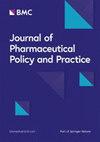出于良心拒服兵役--对澳大利亚药剂师观点的横断面、基于小故事的混合方法探讨
IF 3.3
Q1 HEALTH POLICY & SERVICES
Journal of Pharmaceutical Policy and Practice
Pub Date : 2024-04-02
DOI:10.1080/20523211.2024.2323086
引用次数: 0
摘要
摘要 背景:医疗保健中的良心反对(CO)是一个有争议的话题。一些人认为良心反对是良心自由,另一些人则认为他们的专业护理职责高于个人观点。有关药剂师对良心反对的看法的文献很少。目的:探讨澳大利亚药剂师在复杂情况下围绕 "CO "做出的决策及其选择的原因。方法:就药剂师对一氧化碳的看法进行横向定性问卷调查。小插曲式问题涉及医疗终止妊娠、紧急避孕、同性伴侣试管婴儿代孕和自愿辅助死亡(VAD)等相关情景:大约一半的参与者(n = 223)认为药剂师有权提供处方,而且大多数人同意在所有情景中提供处方。然而,那些选择不提供处方的参与者(n = 20.9%)认为,即使冒着病人无法获得治疗的风险,也要提供处方。在 4 个案例中,有 3 个案例中的强烈自我宗教信仰与不提供处方的决定有显著的统计学关系。三个新出现的主题包括:伦理考虑、药剂师的角色以及培训和指导。结论:这项探索性研究揭示了澳大利亚药剂师的观点,即药房缺乏有关一氧化碳的指导。研究结果强调了未来研究的必要性,即进一步调查和开发培训与专业框架,阐明指导药剂师处理 CO 的步骤。本文章由计算机程序翻译,如有差异,请以英文原文为准。
Conscientious objection – a cross-sectional, vignette-based, mixed methods exploration of Australian pharmacists’ perspectives
ABSTRACT Background: Conscientious objection (CO) in healthcare is a controversial topic. Some perceive CO as freedom of conscience, others believe their professional duty-of-care overrides personal-perspectives. There is a paucity of literature pertaining to pharmacists’ perspectives on CO. Aim: To explore Australian pharmacists’ decision-making in complex scenarios around CO and reasons for their choices. Method: A cross-sectional, qualitative questionnaire of pharmacists’ perspectives on CO. Vignette-based questions were about scenarios related to medical termination, emergency contraception, IVF surrogacy for a same-sex couple and Voluntary Assisted Dying (VAD) Results: Approximately half of participants (n = 223) believed pharmacists have the right to CO and most agreed to supply prescriptions across all vignettes. However, those who chose not to supply (n = 20.9%), believed it justifiable, even at the risk of patients failing to access treatment. Strong self-reported religiosity had a statistically significant relationship with decisions not to supply for 3 of 4 vignettes. Three emergent themes included: ethical considerations, the role of the pharmacist and training and guidance. Conclusion: This exploratory study revealed perspectives of Australian pharmacists about a lack of guidance around CO in pharmacy. Findings highlighted the need for future research to investigate and develop further training and professional frameworks articulating steps to guide pharmacists around CO.
求助全文
通过发布文献求助,成功后即可免费获取论文全文。
去求助
来源期刊

Journal of Pharmaceutical Policy and Practice
Health Professions-Pharmacy
CiteScore
4.70
自引率
9.50%
发文量
81
审稿时长
14 weeks
 求助内容:
求助内容: 应助结果提醒方式:
应助结果提醒方式:


